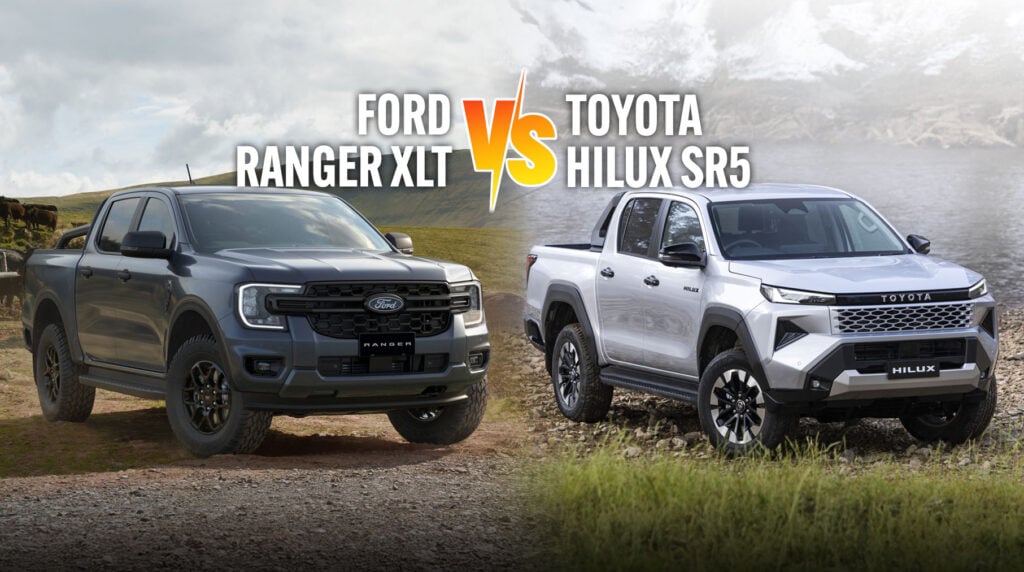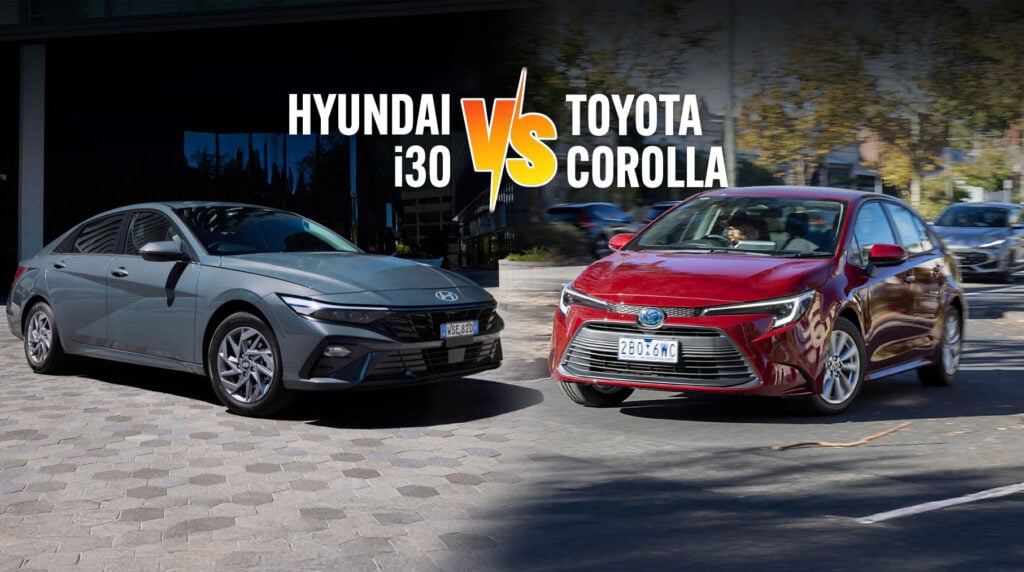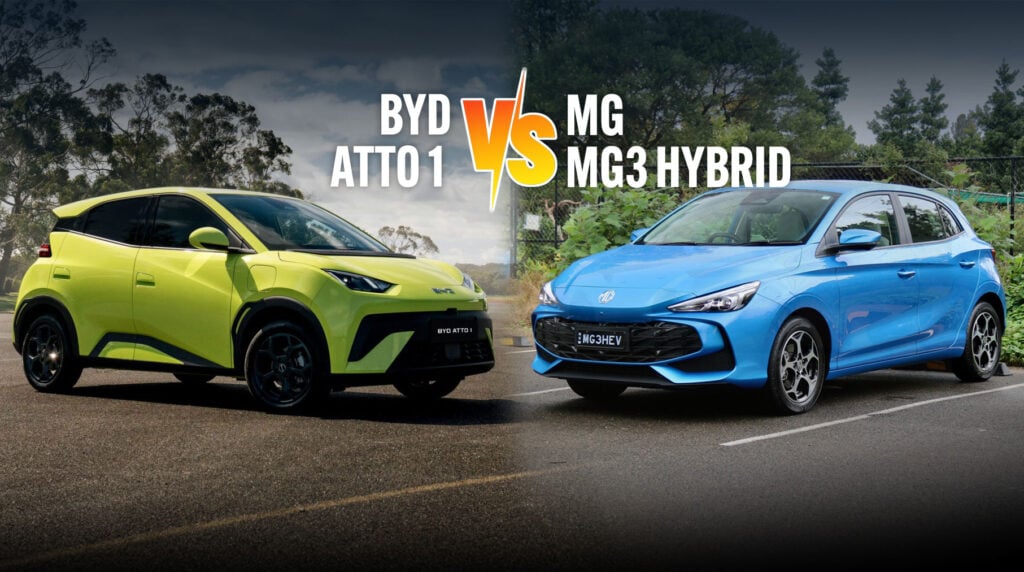
When Mazda released the CX-30 in February 2020, Toyota’s contemporary small SUV – the style-forward C-HR – didn’t have the practicality or value to compete with the gorgeously-presented yet still family-friendly Mazda. Now, Toyota is back with the Corolla Cross.
The 2023 Corolla Cross addresses many of the criticisms we had of the C-HR – such as the cramped back seat and tiny boot – though loses out on some exterior wow factor. The design is undeniably pedestrian, but the payoff is back-seat and boot space, or so goes the theory.
A small SUV is, ostensibly, all a family needs, and it’s a fierce marketplace to compete in. So the Corolla Cross will have to offer more than just extra practicality to win this test.

The Corolla Cross’s powerful fifth-gen hybrid system chews just 4.3L/100km of 91 RON, which should help its case. The powertrain develops 146kW of power, beating not only the CX-30 G20’s 6.5L/100km combined fuel consumption figure but also its 114kW power output.
On paper, then, the Corolla Cross’s spacious body, efficient hybrid and proven underpinnings are off to a strong start against the CX-30.
And even though the Corolla Cross gave everyone a bit of price shock on launch, in mid-spec GXL hybrid AWD guise ($42,250 before on-road costs) the Toyota actually looks like pretty reasonable value next to the petrol-only and front-drive CX-30 G20 Touring SP ($38,490 before on-road costs).

Jump ahead
Pricing and features
Drop the spec sheet for a moment and let your eyes wander over this pair, and visual presentation is a different story.
The CX-30 could have rolled out of a BMW or Audi dealership. There’s intricate body surfacing, high-quality cabin materials almost everywhere you look and a sense of solidity. The tested Touring SP amps visual impact with dark 18-inch alloys outside and burgundy leather within.
Meanwhile, the Corolla Cross feels thin and plasticky in an ‘Old Toyota’ way, more like the decidedly average 10th-gen Corolla than the euro-chic C-HR and substantial RAV4.
But looks ain’t everything, and when it comes to tech the Corolla’s package is more up-to-date. The GXL gets a large 10.5-inch touchscreen with connected services, impressive voice control, navigation, wireless Apple CarPlay (though wired Android Auto) and a 7.0-inch digital driving display.

If the Toyota’s processing power is stronger, the CX-30’s graphic interface comes from a higher level of design – think Windows 10 vs MacOS. The CX-30’s eight-speaker sound system is warmer and more natural in its timbre than the Corolla Cross’s, too.
Annoyingly, you need to use the rotary controller for everything in the CX-30 as its 8.8-inch display is non-touch. This isn’t too bad with Mazda’s own software but can prove a nightmare when trying to find your favourite Taylor Swift song using Apple CarPlay or Android Auto (both of which require a wired connection).
If the Mazda does claw back something in the technology stakes, it’s the boot-up time. The CX-30’s software is essentially ready to go from the off, whereas the Corolla Cross’s touchscreen takes an awfully long time to become responsive.
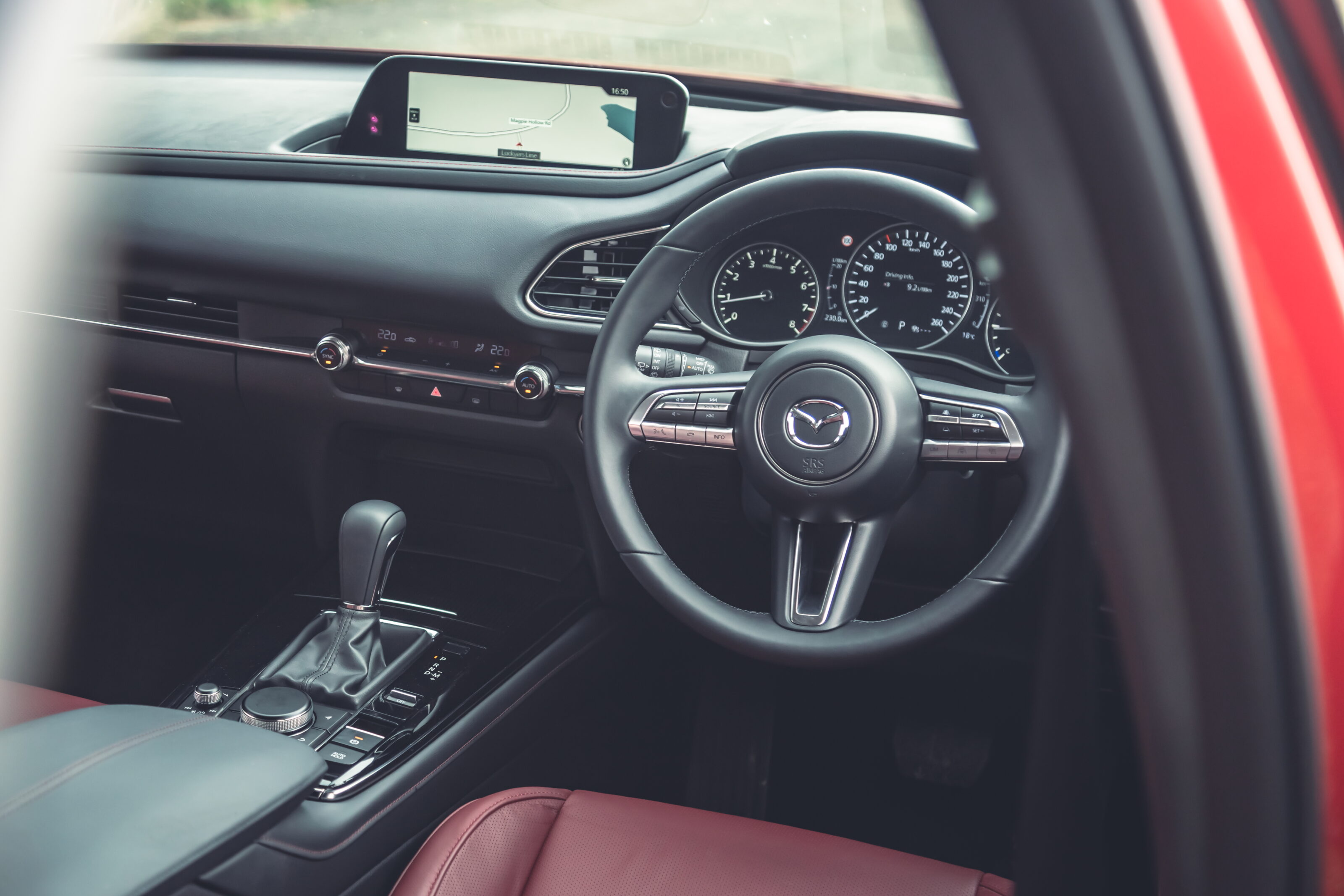
We timed the Corolla Cross’s touchscreen at between 20-22 seconds from hitting the starter button and being able to change music or enter nav directions.
Both cars get dual-zone climate control with physical controls. The Mazda’s dials have satisfyingly-damped clicks, whereas there is nothing special about those of the Corolla Cross.
Corolla Cross GXL vs CX-30 G20 Touring SP features
*Soul Red Crystal paint ($595)
| Corolla Cross GXL hybrid | CX-30 G20 Touring SP |
|---|---|
| $42,250 as tested + on-road costs | $39,085* as tested + on-road costs |
| 10.5-inch touchscreen | 8.8-inch screen |
| 7.0-inch digital driveru2019s display | 7.0-inch TFT driveru2019s display |
| 6-speaker sound system | 8-speaker sound system |
| Manual seats w/ power lumbar | 10-way power seats w/ lumbar, memory |
| Leather-accented upholstery | Burgundy leather upholstery |
| Dual-zone climate control | Dual-zone climate control |
| Keyless entry and go | Keyless entry and go |
| Manual tailgate | Power tailgate |
| Projector LED headlights | Projector LED headlights |
| LED DRLs | Halogen DRLs |
Comfort and space
I mentioned the touch surfaces briefly before, but the CX-30 also rinses the Corolla Cross for front seat comfort. Its burgundy leather-appointed eight-way power adjustable seats with two-position driver memory are delightfully comfortable and low-set, just like a hatchback.
The CX-30’s door tops, dash top and armrest are appointed in lovely squishy leather-like materials across the range, too. These don’t only add bragging rights in a road test either; the soft materials dampen sounds, like coarse chip surfaces or bickering journalists in the back seat.
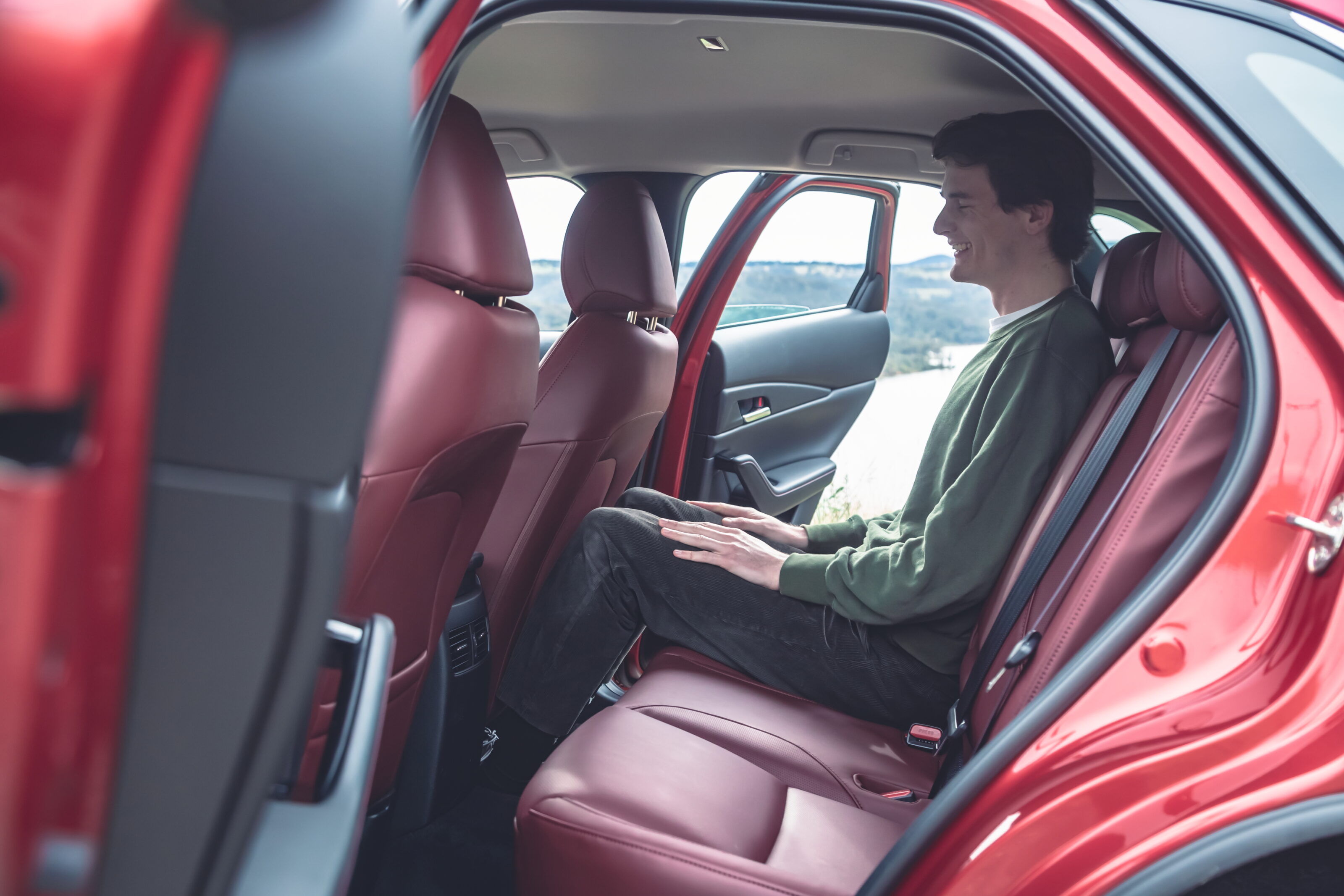
Speaking of, the CX-30’s excellent materials can’t make up for what is a cramped back seat. At 188cm tall I do just fit, but there’s only a whisker of head, leg and toe room spare. The backrest is also very upright, though there’s more under-thigh support than in the Corolla.
The Corolla Cross, meanwhile, has rather cheap feeling plastics up front. The dash top is all hard and scratchy and this wraps around the right side of the dashboard next to the steering wheel. The wheel’s leather upholstery isn’t as luxurious as the CX-30’s either.
And, even though you’re paying nearly $47K on the road, the Corolla doesn’t get electric seat adjustment and the manual controls don’t offer the minute customisation of the best. There is at least power lumbar adjustment, and the mix of vinyl and cloth upholstery is a lot nicer than the base GXL.
Neither car on test matches the best in class – such as a Skoda Kamiq or Honda HR-V – for surprise and delight storage spaces, but there are reasonable door bins, cup holders and covered storage.

Where the Corolla really makes a mark compared to the CX-30 is in the rear quarters. The black headliner and upholstery may make it dingier than the Mazda’s bright cabin but there’s heaps of head, knee and toe room in the Toyota. The only thing missing is a fold-down armrest, but there are two USB-C charge points and adjustable air vents.
The Corolla Cross and Mazda CX-30 both have three top tether points and two sets of ISOFIX anchors for securing child seats.
Boot space is a similar story to rear seats. The Corolla Cross’s squared-off rear end nets more usable space. This GXL AWD hybrid has 390 litres of VDA space – still better than the CX-30’s 317L – but the front-drive Corolla Cross climbs to 414L and gets a space-saver spare, like the CX-30.
The 2023 Mazda CX-30 Touring SP is equipped with a power tailgate where the Corolla Cross GXL gets DIY boot access.
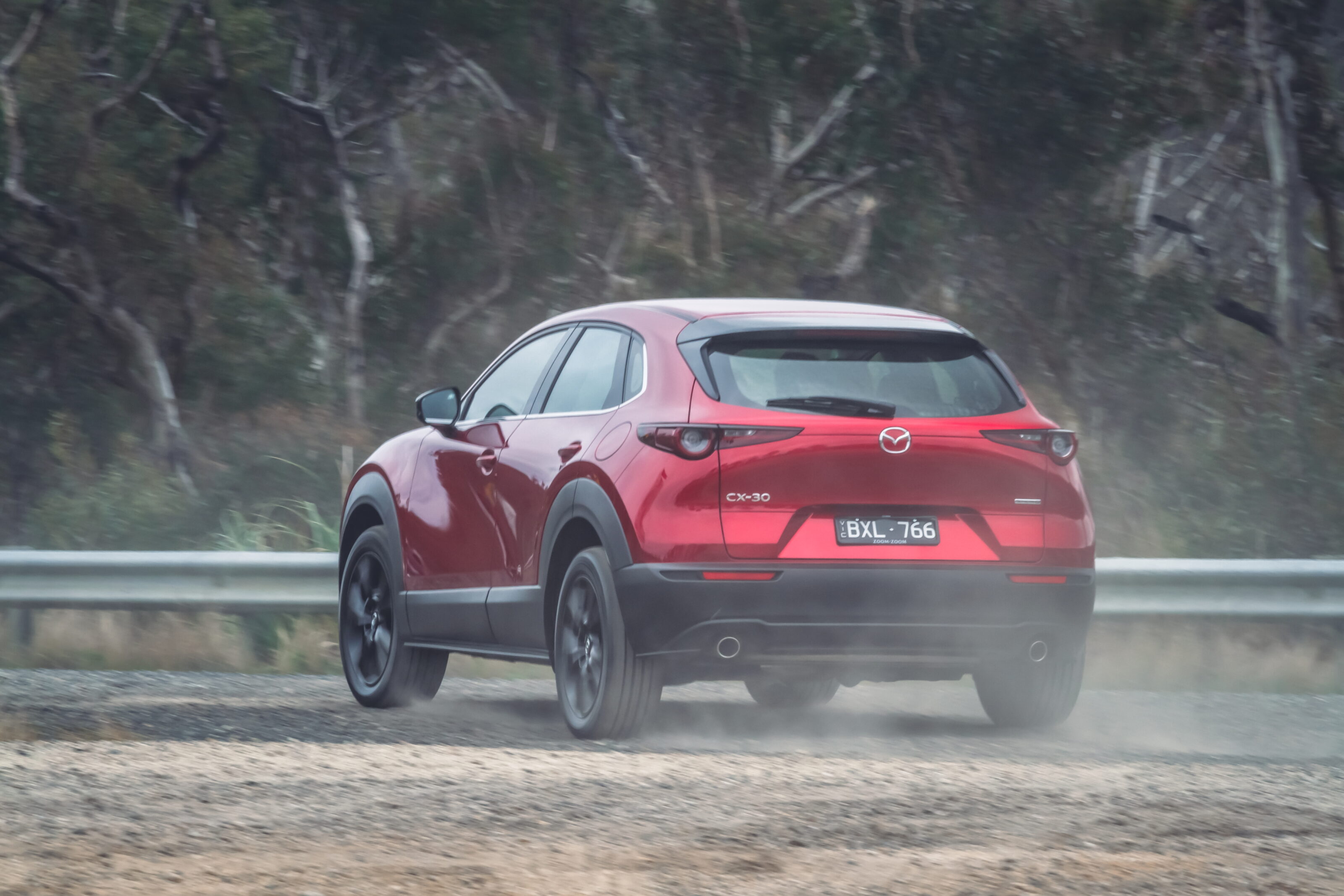
On the road
The Mazda CX-30 is a little hamstrung in this review, arriving on test without a hybrid powertrain to battle the Corolla Cross directly. You’d be right to think Mazda makes a hybrid, but it’s about as mild as they come, and only drops fuel consumption by 0.2L/100km.
Instead, we’ve gone for the more affordable G20 powertrain, which features a 2.0-litre four-cylinder ‘Skyactiv’ petrol engine with direct injection, a 13.0:1 compression ratio and outputs of 114kW/200Nm. The 139kW/252Nm G25 powertrain would have given the Toyota a better run for its money but wasn’t available for the test period.
The CX-30 G20 uses a six-speed torque-converter automatic transmission and its calibration is excellent. The ’box knows how to use the strong torque available (the peak is at 4000rpm) and the shift paddles are obedient to manual down-changes.
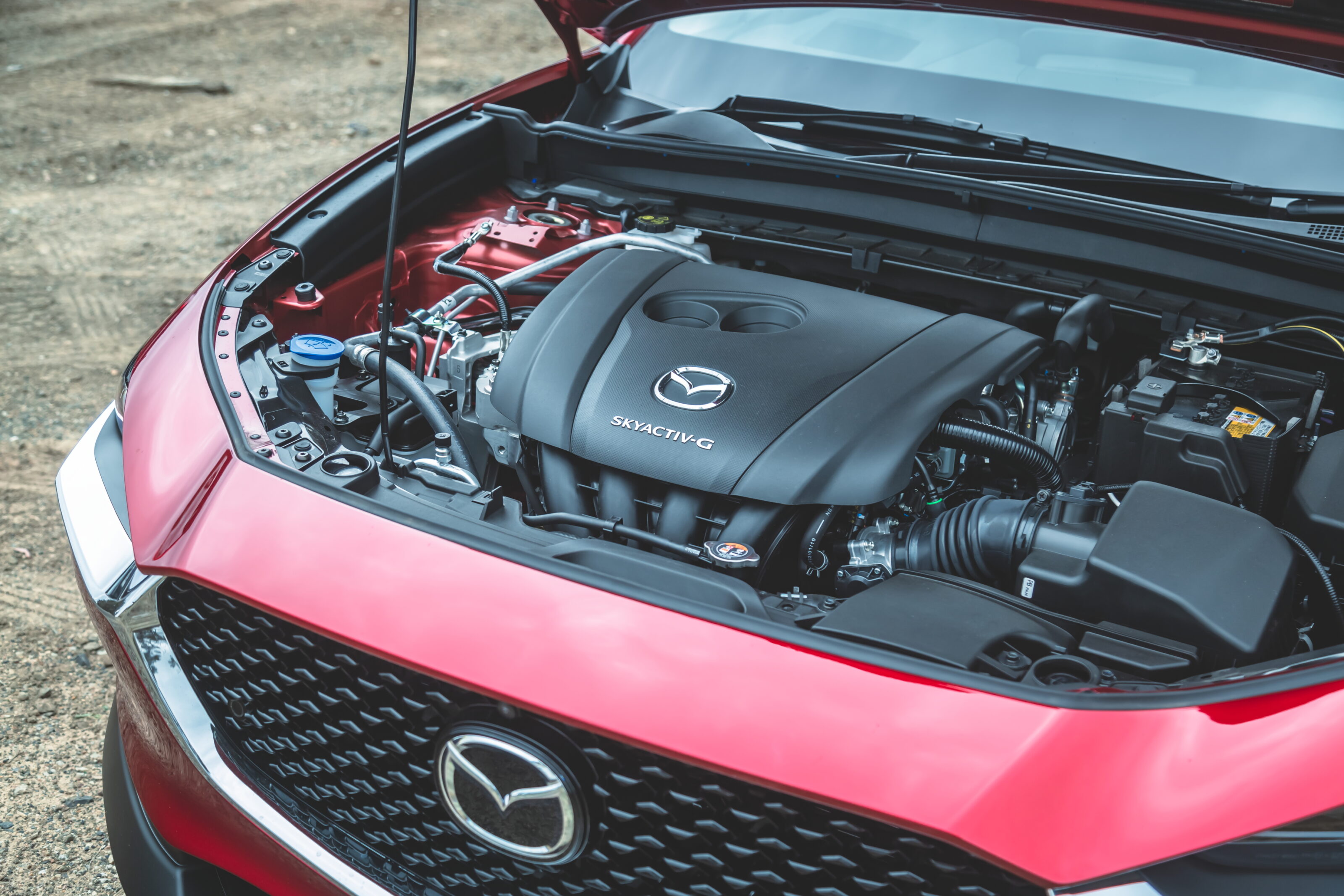
In front-wheel drive form, Mazda claims a relaxed 0-100km/h sprint of 10.2 seconds for the CX-30 G20, just about adequate for this kind of vehicle but nowhere near the AWD Corolla Cross’s rapid 7.6-second claim.
The Corolla Cross debuts Toyota’s fifth-gen hybrid tech that aims to be more athletic and sporty than the fourth-gen system. It’s built around a 2.0-litre petrol engine and the AWD version gets a pair of electric motors. Peak power is 146kW; Toyota does not claim a combined torque figure.
A separate 30kW rear electric motor drives the rear wheels with no physical connection to the front axle or combustion engine. It’s nice to have, but we don’t reckon it’s worth the $3000 over the two-wheel drive hybrid.
The Corolla Cross uses a continuously variable transmission (CVT) to distribute the engine’s grunt and, although sometimes that 2.0-litre atmo engine can sound thrashy, it’s mostly refined and buttery smooth around town.

It is properly plush around town, this Corolla Cross, riding on 215/60 R17 Bridgestone Alenza tyres and the raised body height providing greater suspension travel than a Corolla hatch. The dampers and springs move through the travel smoothly, and bottom-outs are arrested by squishy bump stops.
This isn’t so much the case for the CX-30, which rides more like a lifted, sporty hatch than a plush SUV. The 18-inch alloys shod in 215/45 Toyo Proxes tyres just don’t have as much sidewall to give. Add to that firm springs and dampers, and the CX-30’s ride is abrupt around town.
Also, that attractive exterior is unfortunate for the CX-30’s visibility and its low-set driver’s seat emphasises the high scuttle and thick C-Pillar.
The Mazda improves out in the countryside, where that firm suspension offers greater cornering support. The front end is pointy and the chassis adjustable, even if the rear torsion beam does occasionally skip over mid-corner bumps.
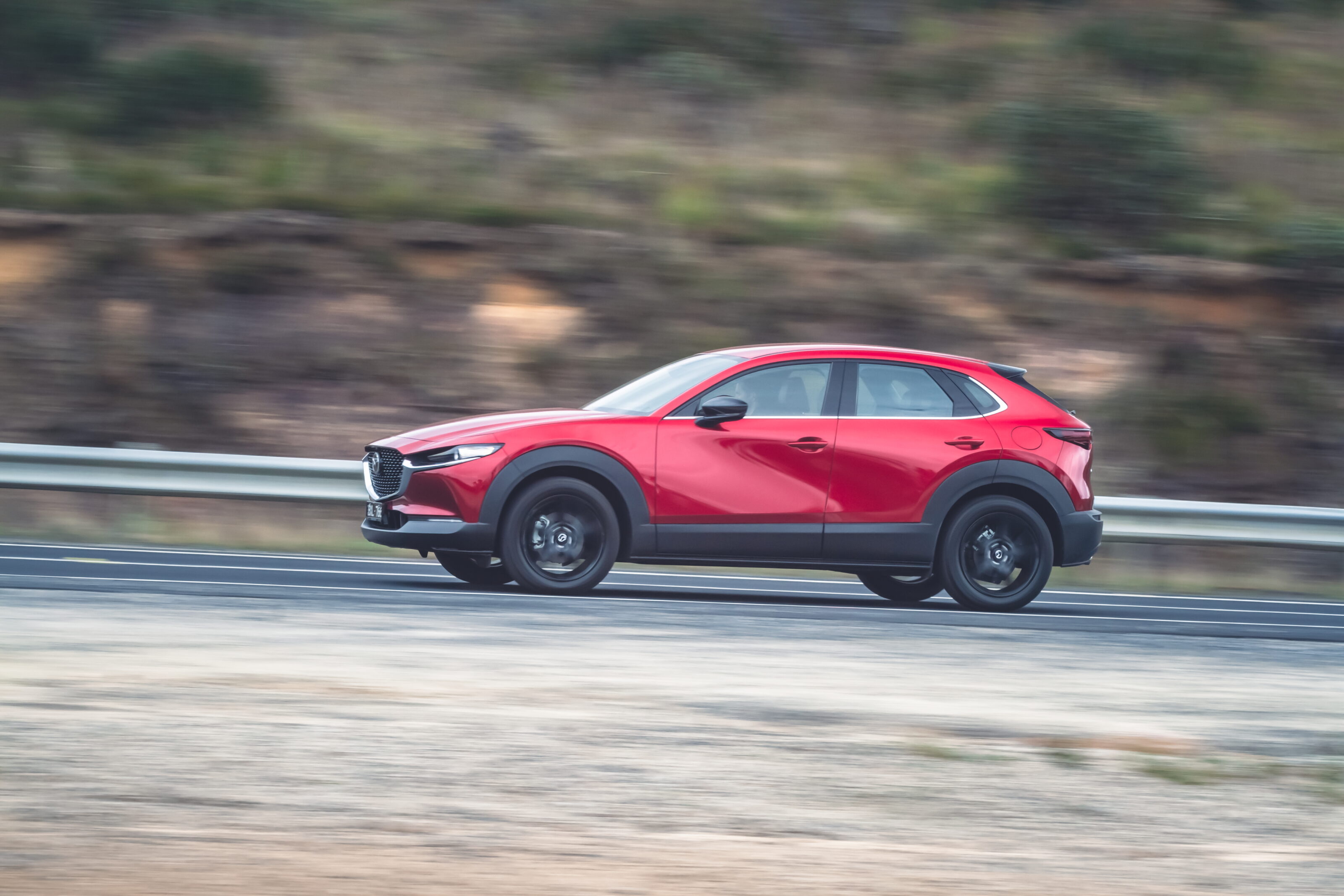
Road noise is well suppressed in the CX-30, thanks in part to a cabin with an air of quality and solidity about it, right down to the bassy and reassuring indicator chime.
The Corolla Cross can hold its own, though. It has more pronounced body lean than the CX-30, but there’s plenty of talent from its TNGA-C platform that we know and love in the Corolla hatch.
I wasn’t expecting this, but the Corolla Cross also has a more consistent steering feel than the Mazda. It’s light and video-gamey – even in Sport mode – but the CX-30’s steering has an unpleasant stiction and dead zone around the straight-ahead that isn’t apparent in the Corolla Cross or Mazda’s related and sweeter-handling 3 hatch.

Unfortunately, the Corolla Cross’s brake feel is spongy, with a pronounced transition from regen to pad biting the rotor that makes it difficult to modulate. The stoppers feel a step backwards from the Corolla hatch.
The driving enthusiast will likely appreciate the dynamism of the CX-30, but the punchier Corolla Cross strikes a better balance as a comfortable and adequately powerful small SUV.
Safety
It’s a shame, then, that the Corolla Cross GXL’s 360-degree camera is a jump down not only from the CX-30 but annoyingly the range-topping Atmos grade, which gets a much crisper surround-view monitor.
Both the 2023 Mazda CX-30 Touring SP and Corolla Cross GXL received five stars in ANCAP testing. The CX-30 was evaluated in 2019 and therefore did not need its auto emergency braking (AEB) to have a junction assist function to pass, although the grade tested here is fitted with front cross-traffic assist.
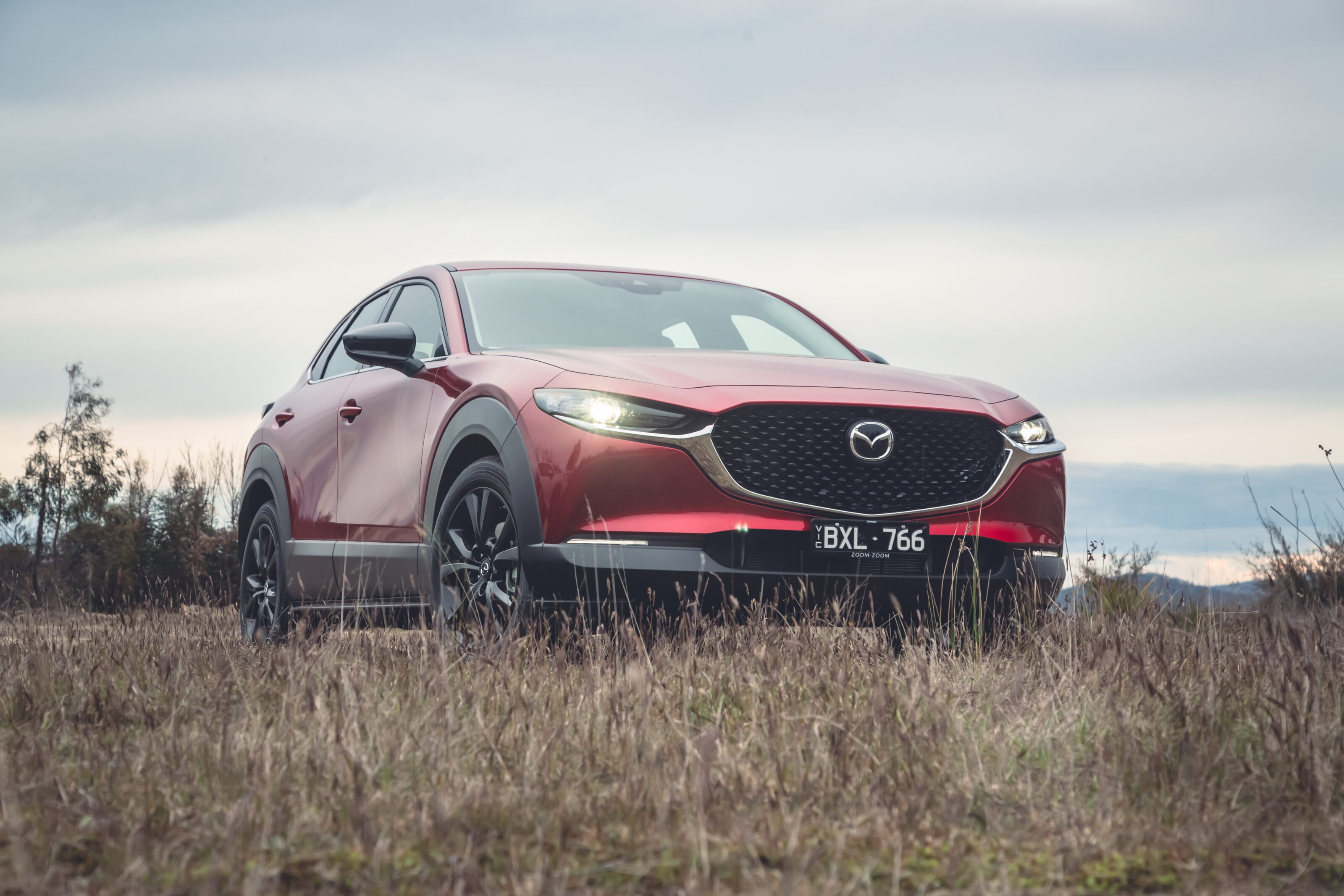
The Corolla Cross and CX-30 both have forward AEB with pedestrian, cyclist and junction detection, reverse AEB, rear cross-traffic alert, a 360-degree monitor, front and rear parking sensors and traffic-sign recognition.
As for semi-autonomous aids, both the CX-30 Touring SP and Corolla Cross GXL have adaptive cruise control and lane-trace assist programs. Neither’s radar cruise is stand-out in class, and while the Toyota’s lane trace is more tenacious, the CX-30’s is less grabby and therefore preferable.
Fuel
Whether you like the driving experience of one small SUV more than the other is quite a personal thing, but the difference in fuel economy is stark.
On a 320km test loop out of Sydney’s suburbs, the CX-30 returned a reasonable 7.8L/100km figure, but the Corolla Cross beat it by nearly 40 per cent at 5.0L/100km.

On the freeway back into Sydney, The Corolla Cross kept consistent at 4.9L/100km, while the Mazda clawed some ground back, matching its ADR rating (6.5L/100km) with 6.4L/100km showing on the trip computer.
Where the Corolla really excels is in urban environments, where it’s possible to keep consumption in the mid-4.0L/100km range with a gentle foot. The Mazda, on the other hand, climbs to about 8-8.5L/100km in urban running.
The CX-30 and Corolla Cross will both accept 91 RON unleaded petrol or an E10 blend at the bowser.

Ownership
Both cars are covered with five-year, unlimited-kilometre warranties by their respective manufacturers. In this space, the Mitsubishi ASX and Eclipse Cross, Kia Seltos and Haval Jolion offer longer warranties, but Toyota’s name is proven and trusted when it comes to reliability.
The CX-30 and Corolla Cross require maintenance every 12 months. The Corolla can travel a longer 15,000km in that time, while the Mazda must return to a workshop every 10,000km.
For the Corolla Cross, maintenance over five years or 75,000km of ownership costs $1150. For five years of servicing in the CX-30, you’ll pay $1762.
While the Corolla Cross’s connected features are very handy, they are only included for 12 months. That means you’ll need to pay an ongoing subscription fee every month to keep the services.

Toyota Connect+ (vehicle tracking and status features) costs $9.95/month, and to keep connected multimedia including ‘Hey Toyota’ and search functionality, that’ll be another $12.50 each month. A year of the full package will cost $270.
VERDICT
With this pair, the decision comes down to that old cliche – the heart or the head.It’d be hyperbole to say the Mazda CX-30 gets the heart racing (although no judgement if it does for you), but little touches like its indicator chime, plush cabin, available red leather and attractive styling make it the more emotional choice of the pair.The Corolla Cross does its job better, though. It’s a small SUV with space for four and their luggage. The ride is more comfortable, the engine more frugal and the technology package fresher.Although the CX-30 may have been Wheels Car of the Year in 2021, it’s the Corolla Cross that takes a slim win in this twin test. It offers all the things a family needs from a small SUV, even if it is uncomfortably close to a RAV4 in price.
Scoring
Toyota Corolla Cross GXL Hybrid AWD: 8/10
Things we like
- Roomy back seat
- Efficient hybrid
- Ride comfort
- Steering consistency
Not so much
- Dull cabin
- Sluggish infotainment
- Interior plastics
Mazda CX-3 G25 Touring SP: 8/10
Things we like
- Plush cabin
- Refined engine
- Back-road dynamics
- Transmission calibration
Not so much
- Jiggly urban ride
- Poor visibility
- cramped back seat
Toyota Corolla Cross and Mazda CX-30 specifications
| Feature | Corolla Cross GXL Hybrid AWD | Mazda CX-30 G25 Touring SP |
|---|---|---|
| Price | $42,250 as tested + on-road costs | $39,085* as tested + on-road costs |
| Engine | 2.0L 16V dohc Atkinson cycle petrol 4cyl | 2.0L 16V dohc petrol 4cyl |
| Motor (F) | permanent magnet asynchronous motor 83kW/206Nm | NA |
| Motor (R) | permanent magnet asynchronous motor 30kW | NA |
| Power | 146kW | 139kW |
| Torque | not stated | 252Nm |
| Gearbox | continuously variable | six-speed automatic |
| 0-100km/h | 7.6 seconds | 9.1 seconds |
| Body | steel, 5 doors, 5 seats | steel, 5 doors, 5 seats |
| L/W/H/Wu2013B | 4460/1825/1620/2640mm | 4395/1795/1540/2655mm |
| Track (F/R) | 1570/1570mm | 1565mm |
| Weight | 1545kg | 1478kg |
| Fuel/tank | 91 RON / 43 litres | 91 RON / 51 litres |
| Economy | 5.0L/100km (tested) | 7.8L/100km (tested) |
| Suspension | Front: struts, coil springs, anti-roll bar. Rear: multi-link, coil springs, anti-roll bar | Front: struts, coil springs, anti-roll bar. Rear: Torsion beam, coil springs, anti-roll bar |
| Steering | electric rack and pinion | electric rack and pinion |
| Front brakes | ventilated discs (305mm) | ventilated discs (295mm) |
| Rear brakes | solid discs (281mm) | solid discs (265mm) |
| Tyres | Bridgestone Alenza | Toyo Proxes R59 |
| Tyre size | 215/60R17 | 215/45R18 |
We recommend
-
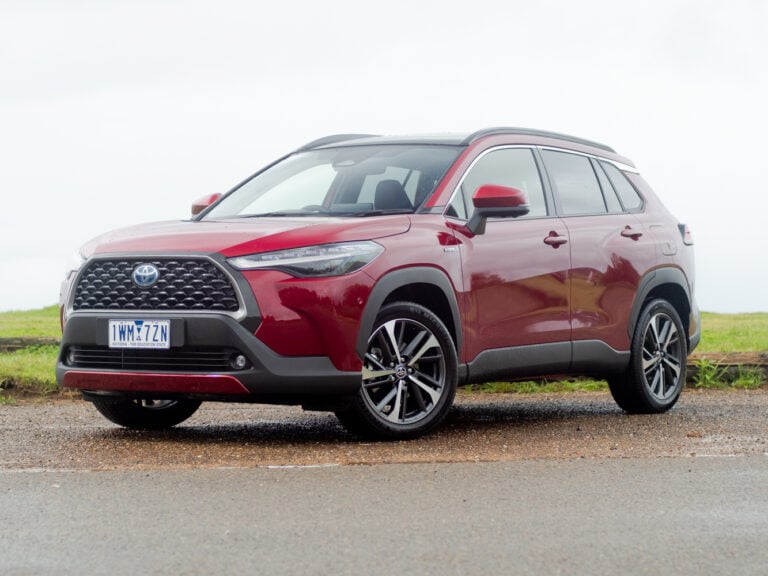 Reviews
Reviews2023 Toyota Corolla Cross review: Australian launch
The Corolla Cross mates the hatch’s frugal hybrid and TNGA-C platform with a small SUV form factor, so it should be a screaming success
-
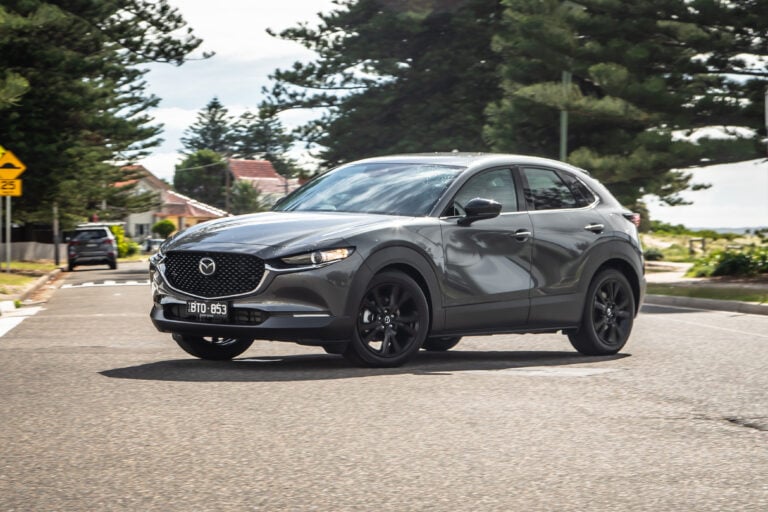 Reviews
Reviews2022 Mazda CX-30 G25 Touring review
Mazda's impressive upsized compact SUV scores the blacked-out SP trim in Touring form
-
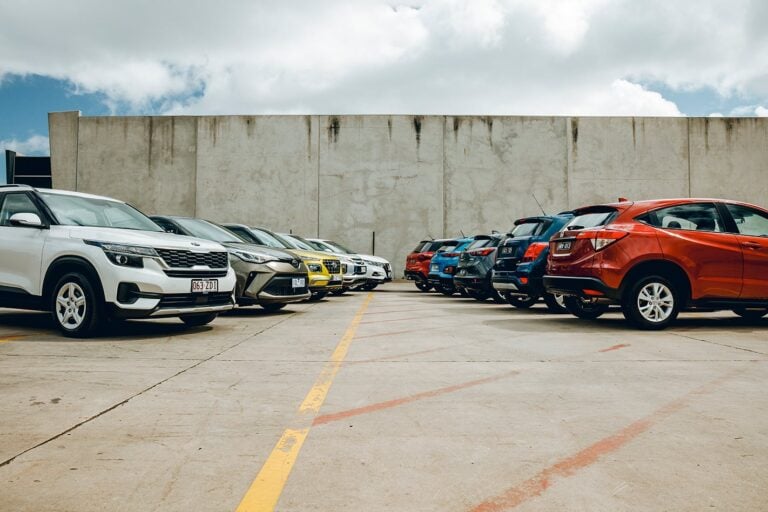 Reviews
Reviews2020's Best Small SUV Megatest
Thinking about making a big decision on a small SUV? Step away from the dealership until you've read our fearless ranking.


